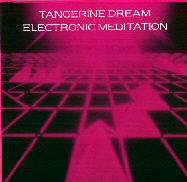|
|
|
01 |
Genesis |
|
|
|
05:56 |
|
|
02 |
Journey Through A Burning Brain |
|
|
|
12:26 |
|
|
03 |
Cold Smoke |
|
|
|
10:38 |
|
|
04 |
Ashes To Ashes |
|
|
|
04:06 |
|
|
05 |
Resurrection |
|
|
|
03:27 |
|
|
|
| Cat. nummer |
125 |
| Verpakking |
Jewel Case |
| SPARS |
DDD |
| Geluid |
Stereo |
|
|
| Drums and Percussion |
Klaus Schulze |
| Guitar-Electric |
Conrad Schnitzler |
| Guitar-Electric |
Edgar Froese |
| Organ |
Edgar Froese |
| Organ |
Jimmy Jackson |
| Piano |
Edgar Froese |
| Cello |
Conrad Schnitzler |
| Violin |
Conrad Schnitzler |
| Flute |
Thomas Keyserling |
|
| Tekstschrijver |
Conrad Schnitzler; Edgar Froese; Klaus Schulze |
|
by John Bush Without doubt, the recordings of Tangerine Dream have made the greatest impact on the widest variety of instrumental music during the 1980s and '90s, ranging from the most atmospheric new age and space music to the harshest abrasions of electronic dance. Founded in 1967 by Edgar Froese in Berlin, the group has progressed through a full three dozen lineups (Froese being the only continuous member with staying power) and four distinct stages of development: the experimentalist minimalism of the late '60s and early '70s; stark sequencer trance during the mid- to late '70s, the group's most influential period; an organic form of instrumental music on their frequent film and studio work during the 1980s; and, finally, a more propulsive dance style, which showed Tangerine Dream with a sound quite similar to their electronic inheritors in the field of dance music. Froese, born in Tilsit, East Prussia in 1944, was little influenced by music while growing up. Instead, he looked to the Dadaist and Surrealist art movements for inspiration, as well as literary figures such as Gertrude Stein, Henry Miller and Walt Whitman. He organized multimedia events at the residence of Salvador Dali in Spain during the mid-'60s and began to entertain the notion of combining his artistic and literary influences with music; Froese played in a musical combo called the Ones, which recorded just one single before dissolving in 1967. The first lineup of Tangerine Dream formed later that year, with Froese on guitar, bassist Kurt Herkenberg, drummer Lanse Hapshash, flutist Voker Hombach and Charlie Prince. The quintet aligned itself with contemporary American acid rock (the Grateful Dead, Jefferson Airplane), and played around Berlin at various student events. The lineup lasted only two years, and by 1969 Froese had recruited wind player Conrad Schnitzler and drummer Klaus Schulze. One of the trio's early rehearsals, not originally intended for release, became the first Tangerine Dream LP when Germany's Ohr Records issued Electronic Meditation in June 1970. The LP was a playground for obtuse music-making — keyboards, several standard instruments, and a variety of household objects were recorded and filtered through several effects processors, creating a sparse, experimentalist atmosphere. Both Schulze and Schnitzler left for solo careers later in 1970, and Froese replaced them the following year with drummer Christopher Franke and organist Steve Schroeder. When Schroeder left a year later, Tangerine Dream gained its most stable lineup core when organist Peter Baumann joined the fold. The trio of Froese, Franke and Baumann would continue until Baumann's departure in 1977, and even then, Froese and Franke would compose the spine of the group for an additional decade. On 1971's Alpha Centauri and the following year's Zeit, the trio's increased use of synthesizers and a growing affinity for space music resulted in albums that pushed the margin for the style. Atem, rele
